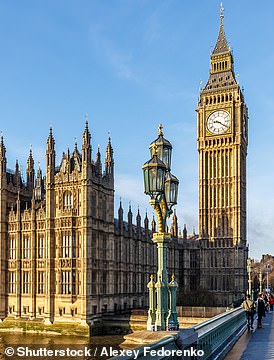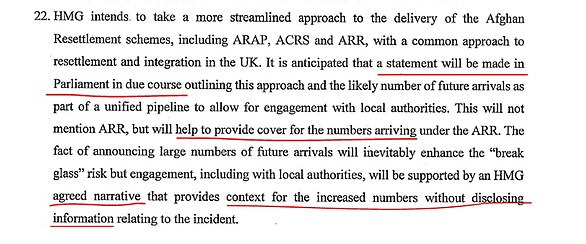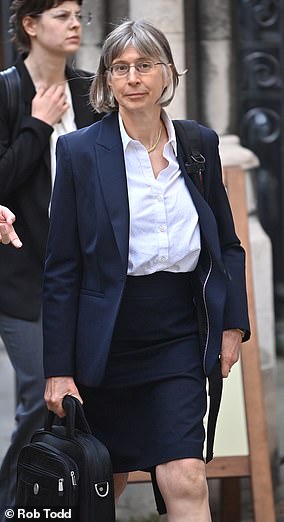Never had I witnessed such an extraordinary scene in almost 30 years of reporting from the Press benches of the Royal Courts.
The High Court judge, Mr Justice Chamberlain, appeared genuinely incredulous. He had just been informed that His Majesty’s Government was preparing to actively deceive Parliament.
Ministers were planning to ‘deliberately mislead the public’, to keep both MPs and the public in the dark about a secret immigration scheme costing taxpayers a projected £7billion.
A scheme bringing to our shores thousands of Afghans whose lives had been put at risk from vengeful Taliban warlords following a massive Ministry of Defence data breach which revealed they had supported Britain during the UK’s 20 years of operations in the country.
Mr Justice Chamberlain looked across the oak-panelled courtroom. The doors were firmly locked. When he spoke, he chose his words carefully. The Government’s proposed course of action was, he said with some understatement, ‘a very, very striking thing’. It seemed he was deeply unimpressed.
His words came in a behind-closed-doors hearing at the High Court last November to consider the unprecedented legal order of a superinjunction imposed to prevent reporting after the Daily Mail discovered the Afghan data breach.
This was the first time a British government has deployed a superinjunction – which more usually are used by philandering footballers and celebrities to stop stories about their peccadilloes from being published.

Natalie Moore, a senior MOD official, told the court a statement would be made to Parliament to ‘provide cover’ for Afghans arriving in Britain – without telling the public why. Mr Justice Chamberlain called it ‘a statement that doesn’t tell the whole truth to Parliament’
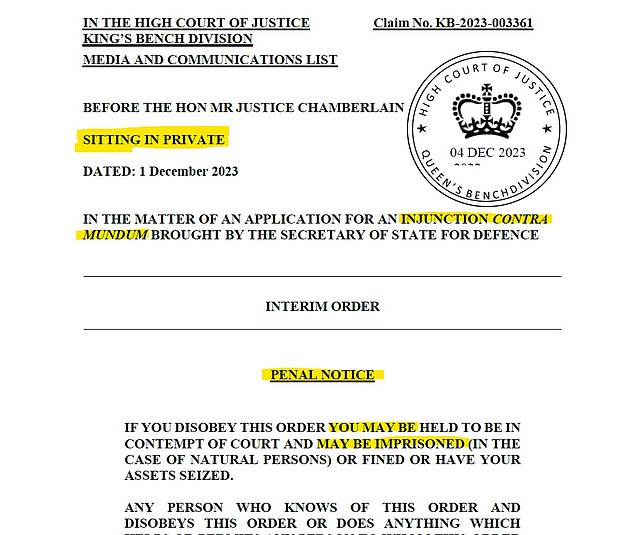
Mail journalists faced jail by order of a Penal Notice if they revealed the Government’s secret – or even breathed a word about the existence of the draconian court order

The Daily Mail’s fight for open justice meant we took part in court hearings shown hundreds of secret Whitehall briefing papers
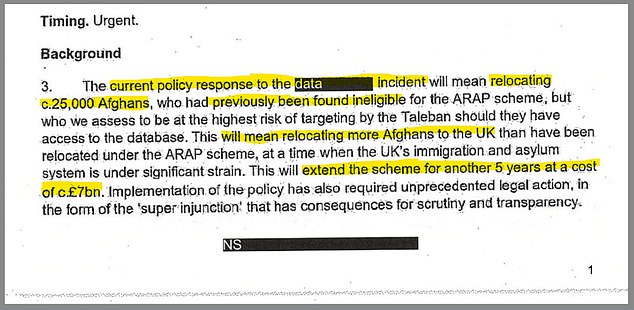
A bombshell document – never seen before – revealing how Labour ministers met in October 2024 and agreed a scheme to relocate about 25,000 Afghans to the UK at a cost of £7billion
Football star Ryan Giggs was unmasked in 2011 as having obtained one to suppress the fact of his extramarital fling with former topless model Imogen Thomas, for instance. Another high-profile public figure, who cheated on his wife, was able to hush it up because he claimed it would be ‘very distressing’ for his family if it were made public.
So harsh are the legal constraints of a superinjunction that it is illegal even to report its existence.
Which is why for two years, the public and MPs have been completely unaware of the scandal of the Afghan data breach and the Government’s emergency migration scheme costing the taxpayer billions of pounds.
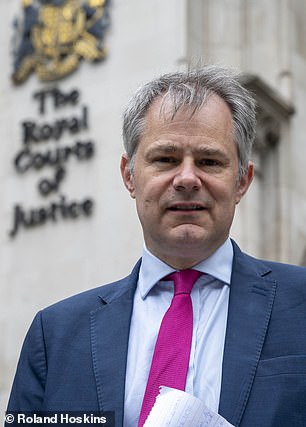
Sam Greenhill attended more than 20 hearings at the High Court held in secret courtrooms where the doors were physically locked, as he and other journalists held the Government to account despite the superinjunction stifling all public knowledge and parliamentary debate
This is the story of the Mail’s fight in the High Court against the superinjunction. A fight that led to the draconian order finally being lifted today, so that the full details of the MoD blunder and its eye-watering cost can finally be help up to public scrutiny.
The drama started back in August 2023 after award-winning Daily Mail reporter David Williams was the first journalist in the world to discover that the MOD had disastrously leaked data that put 100,000 people ‘at risk of death’ – a number comprising 18,800 Afghans named in the breach who had applied for sanctuary in Britain, as well as their families, all of whom could now be in the Taliban’s sights.
This was no ‘ordinary’ data leak of the kind associated with scammers and fraudsters that we hear about all the time. It was truly a question of life and death.
Instead of confessing to its mistake after David Williams approached them, the MOD at first obfuscated and then activated their so-called ‘D-Notice’ committee – a shadowy entity that advises the Press of potential damage to national security – in a bid to keep the story under wraps.
During this period we agreed not to publish the story. While it was important to hold the Government to account for its costly blunder, the Mail – which has run an award-winning campaign for 10 years to help Afghans who served with British forces – accepted that time was needed to mount a rescue operation of the Afghans affected by the mistake.

Unmarked government charter planes have been landing at airports, including Stansted and RAF Brize Norton, packed with hundreds of Afghans

The Afghans were flown in from Pakistan and then processed before being whisked off by coach to start a new life in Britain
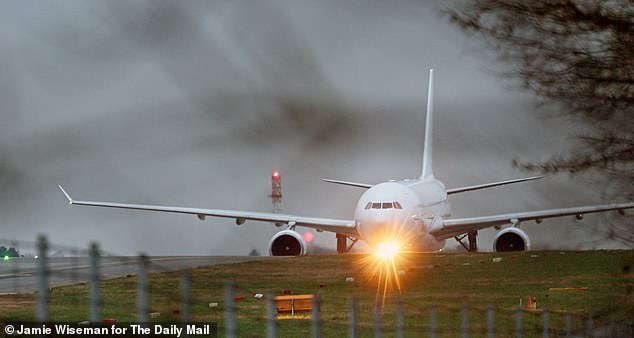
One of the Government’s unmarked planes arriving at Stansted Airport in Essex with 227 Afghans on board
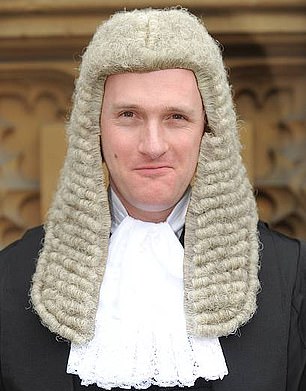
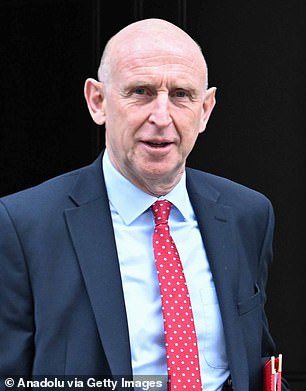
Mr Justice Chamberlain warned the injunction was ‘corrosive to the public’s trust in government’ and remarked that Defence Secretary John Healey was making ‘a statement that doesn’t tell the whole truth to Parliament’
The MOD claimed that revealing the blunder could cause deaths. It argued that if the Taliban did not already know about the leaked list, and were alerted to it, they could find it – and mete out terrible punishments to those it named.
Then, after another journalist learnt of the data breach, along with a civilian campaigner, the Government ordered its lawyers to seek a court injunction to shut down any publication or broadcast.
The superinjunction was imposed on September 1, 2023, by High Court judge Mr Justice Robin Knowles. So wide-ranging were its restrictions that it was called an injunction ‘contra mundum’, which is Latin for ‘against everyone in the world’.
There had been a 14-day window when the Mail could have published its data breach story, but we acted responsibly by agreeing not to. Now, under the superinjunction, my fellow Mail journalists and I lived under the threat of jail if we spread the news, or even told anyone that an injunction existed.
The injunction was supposed to be in place for only a few weeks while the MoD organised its rescue. Yet weeks turned into months, and months eventually into nearly two years.
All the time, the Mail was battling for openness in the secret courtrooms of the High Court, along with journalists from The Times and elsewhere who came to discover the scandal. Month after month, there was costly legal wrangling as Whitehall bureaucrats blew hundreds of thousands of pounds of taxpayers’ money on increasingly desperate manoeuvres to keep the public in the dark.
Even the judge who took over the case, Mr Justice Chamberlain, while initially accepting the need for the injunction, expressed concerns that it was ‘completely shutting down’ democratic accountability. He warned it was ‘corrosive to the public’s trust in government’.
He pointed out that it was thwarting debate or oversight by MPs, the Press and the public about ‘vitally important decisions’ being taken to run the secret immigration scheme costing taxpayers so much money.
And as time went on, there was an alarming development worthy of a George Orwell novel as the Government shifted its justification from ‘saving lives’ to ‘controlling the narrative’ – or in more common parlance, to spin its own version of events.
Successive High Court judges made it plain the unprecedented injunction was an infringement of Press freedom and the public’s right to know. But every time the court considered whether to lift it – and we had over 20 hearings – the Government insisted there was a ‘risk of death’. Nobody was allowed to know the British military had mistakenly leaked the massive database of Afghans, described as a potential ‘kill list’ for the Taliban.
As well as preventing anyone from finding out about the embarrassing fiasco, it also meant MPs were kept in the dark, unable to do their job of holding ministers to account.
There was also a deliberate decision by the Government not to inform members of the Intelligence and Security Committee (ISC), a parliamentary body used to scrutinise government activity, despite its peers and MPs being trusted to handle the most sensitive information.
Mr Justice Chamberlain, who became the judge in charge of the case, grasped the dangers from day one, warning in an early ruling: ‘Open justice is a cardinal constitutional principle, from which derogations can be justified only in exceptional circumstances.’
He said superinjunctions were ‘interferences with freedom of expression which take place under the radar’, and the concerns were magnified when it was the Government involved, adding this was ‘likely to give rise to understandable suspicion that the court’s processes are being used for the purposes of censorship’.
The court was told by Tom Forster KC – a Special Advocate lawyer appointed at the request of Mr Justice Chamberlain to act as a challenge to the Government in the absence of any parliamentary probing – that the lack of scrutiny had put ‘the democratic process in the deep freeze’.
Mr Forster is a security-cleared KC who is privy to classified military information never shared with the Press – yet even he argued strongly that the evidence he had seen did not warrant the excessive secrecy being sought by ministers, and he repeatedly urged the judge to lift the superinjunction.
In February 2024, the judge took the exceptional step of inviting the small number of journalists who knew about the leak, including the Mail, to question a senior MoD official, Natalie Moore, at a private court hearing.
The judge said that although the hearing would not be held in public, he wanted the Press to take an active role in challenging the Government’s arguments.
For over a year, along with former Mail defence correspondent Larisa Brown and reporters from The Independent and broadcaster Global Media, I have been attending these secret High Court hearings. The hearings have not been publicly listed anywhere and are held literally behind closed doors, with everyone physically locked into the courtroom by a clerk before proceedings get under way.
In May last year, there was a breakthrough when the judge sided with the media, ruling that the superinjunction should be lifted in favour of free speech as advocated in court by Jude Bunting, a KC hired jointly by the journalists. Mr Justice Chamberlain ruled the ‘continued stifling of public debate’ was not justified. He said the injunction was ‘closing off public debate on an issue of profound moral and economic significance’.
However the MOD immediately appealed, hiring one of Britain’s most effective (and expensive) KCs, Sir James Eadie, who warned in a fire-and-brimstone address to three Court of Appeal judges last July that lifting the injunction would ‘bring the house down’. They backed the ministers, overruling Mr Justice Chamberlain, and the superinjunction remained in place.
While Operation Rubific, the rescue scheme, was launched under the Conservative government, Labour continued it in secret after taking power in last July’s election. In October, at a Cabinet sub-committee chaired by Labour grandee Pat McFadden and comprising Deputy Prime Minister Angela Rayner, Chancellor Rachel Reeves, Defence Secretary John Healey, Home Secretary Yvette Cooper and Lord Chancellor Shabana Mahmood, they agreed to provisionally expand the scheme, the court was told.
This was even though they had been told of the projected costs had soared to £7billion, that 10 per cent of the new arrivals could end up homeless and that there was a link to last summer’s riots – with disorder ‘hotspots’ being in areas with the highest numbers of Afghan arrivals and asylum seekers.
And it was soon after that when we learnt of a new tactic from the Labour Government – at that secret court hearing last November I described as one the most extraordinary I have witnessed.
Mr Justice Chamberlain was in a blunt mood, stating ‘I’m starting to doubt myself – am I going bonkers?’ when he queried if the projected costs of the scheme to taxpayers were truly so vast. The Government’s security-cleared specialist barrister Cathryn McGahey KC confirmed they were, admitting: ‘Yes – it’s a very large amount of public money being spent without currently any information to the public.’
The judge challenged the secrecy when he told the ministry’s lawyer ‘one can quite understand that we are not going to give chapter and verse on weapons programmes – but this is a resettlement programme for immigrants to the UK’.
Then the Government made its jaw-dropping revelation. In an outrageous leap from the original purpose of the superinjunction, which was to silence the story, ministers were embarking on an alarming new direction in which, while forcing the Press to remain silent, they themselves intended to fill the void.
Natalie Moore, the senior MOD official, told the court a statement would be made to Parliament as a way of seeking to ‘provide cover’, as she put it, for why there were thousands of Afghans arriving in Britain – without actually saying why they were coming.
She exhibited a briefing paper that had been shown to senior ministers at their committee the previous month, containing another chilling turn-of-phrase: ministers intended to ‘control the narrative’. They would create a ‘robust public comms strategy’ to set out ‘the scale but not the cause’ of the Afghans arriving.
This bid to manage the public’s knowledge appeared to trouble the High Court judge who remarked it was ‘very, very striking’ for ministers to be considering making a ‘statement that does not tell the whole truth to Parliament’. The Government’s KC was reduced to replying they would ‘tell as much of the truth as possible’.
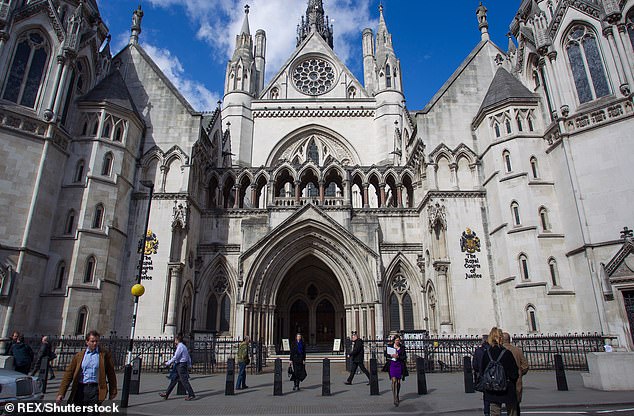
The High Court in London, where more than 20 hearings have been going on in secret over the past two years. A small number of journalists have been allowed to take part to hold the Government to account for its unprecedented actions, with nothing able to be published until today
Jude Bunting, the media’s KC, put it like this: ‘The courts have enabled the Government to put a false narrative in place…The Government is saying it is going to deliberately mislead the public.’
The judge said again: ‘It is very striking.’
Mr Bunting went on to say it undermined democracy, adding: ‘One of the key issues in the political debate right now is who is telling the truth about the public deficit. This is directly relevant to that debate. And another key issue is immigration. The injunction is stopping informed debate about how to house people coming to this country.’
And then, one quiet evening just before Christmas, a bland statement was slipped out to Parliament, in which Defence Secretary John Healey made no mention of any government blunder, glossed over the vast costs to the public and waffled on about the Afghan resettlement programme being ‘a complicated endeavour’ in which ‘there is room for improvement’.
Fast-forward to earlier this month, and there was a further obscure statement to the House axing the Afghan Relocations and Assistance Policy (ARAP) scheme altogether – again without telling the public the real reasons.
And so might the cover-up have continued, until the Government suddenly performed its screeching U-turn last week. Having made dire claims for two years that Parliamentary scrutiny had to be stifled ‘to save lives’, because ‘people will die’, and ‘secrecy has to be maintained to protect life’, it dramatically changed its tune.
Now, suddenly, the judge was being told that, actually, the threat was ‘less than previously thought’ – and it was even possible the Government had ‘inadvertently’ made things worse by getting a superinjunction.
The gagging order was finally lifted 683 days after it was imposed. Ms McGahey said the Defence Secretary’s view was that the media had ‘performed a very necessary public service’. Now it turns to MPs and the public to finally have their say.


